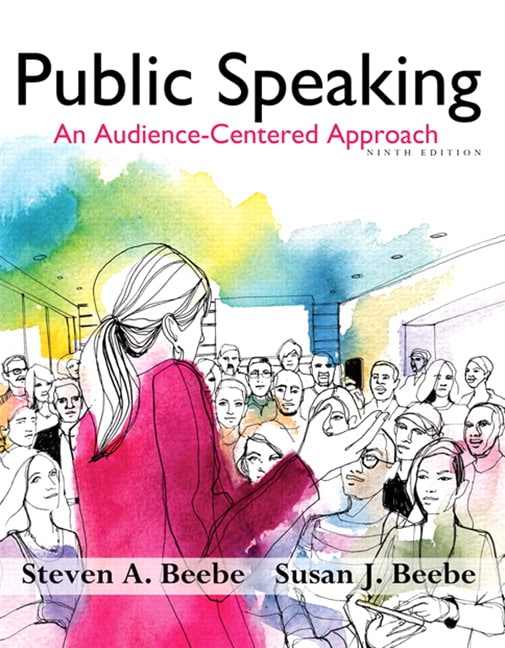
30.00$ - DOWNLOAD
- Digital File Direct & Fast Download ( Bank Exam ZIP & PDF) only for 30.00$
- All chapters are included in the test Bank Exam
- Free samples included once needed (ZIP & PDF)
- Multiple payment options (Paypal , Credit Card) - NO account Required
- Dedicated support / instant chat – Email - Whatsapp
- Digital file of Public Speaking: An Audience-Centered Approach, 9th Edition for sale
Category : Higher Education
***THIS IS NOT THE ACTUAL BOOK. YOU ARE BUYING the Test Bank in e-version of the following book***
In this Section: 1. Brief Table of Contents 2. Full Table of Contents 1. Brief Table of Contents Chapter 1: Speaking with Confidence 2. Full Table of Contents Chapter 1: Speaking with Confidence Chapter 2: Presenting Your First Speech Chapter 3: Speaking Freely and Ethically Chapter 4: Listening to Speeches Overcoming Barriers to Effective Listening Chapter 6: Developing Your Speech Chapter 7: Gathering and Using Supporting Material Chapter 8: Organizing and Outlining Your Speech Chapter 9: Introducing and Concluding Your Speech Chapter 10: Using Words Well: Speaker Language and Style Chapter 11: Delivering Your Speech Chapter 12: Using Presentation Aids Chapter 13: Speaking to Inform Types of Informative Speeches Chapter 14: Understanding Principles of Persuasive Speaking Chapter 15: Using Persuasive Strategies Chapter 16: Speaking for Special Occasions and Purposes Appendix A: Speaking in Small Groups Appendix B: Speeches for Analysis and Discussion Table of Contents
Chapter 2: Presenting Your First Speech
Chapter 3: Speaking Freely and Ethically
Chapter 4: Listening to Speeches
Chapter 5: Analyzing Your Audience
Chapter 6: Developing Your Speech
Chapter 7: Gathering and Using Supporting Material
Chapter 8: Organizing and Outlining Your Speech
Chapter 9: Introducing and Concluding Your Speech
Chapter 10: Using Words Well: Speaker Language and Style
Chapter 11: Delivering Your Speech
Chapter 12: Using Presentation Aids
Chapter 13: Speaking to Inform
Chapter 14: Understanding Principles of Persuasive Speaking
Chapter 15: Using Persuasive Strategies
Chapter 16: Speaking for Special Occasions and Purposes
Appendix A: Speaking in Small Groups
Appendix B: Speeches for Analysis and Discussion
What is Public Speaking?
Why Study Public Speaking?
The Communication Process
The Rich Heritage of Public Speaking
Improving Your Confidence as a Speaker
Consider Your Audience
Select and Narrow Your Topic
Determine Your Purpose
Develop Your Central Idea
Generate the Main Ideas
Gather Supporting Material
Organize Your Speech
Rehearse Your Speech
Deliver Your Speech
Speaking Freely
Speaking Ethically
How to Become a Better Listener
Improving Listening and Critical Thinking Skills
Analyzing and Evaluating Speeches
Chapter 5: Analyzing Your Audience
Gathering Information about Your Audience
Analyzing Information about Your Audience
Adapting to Your Audience
Analyzing Your Audience before You Speak
Adapting to Your Audience as You Speak
Analyzing Your Audience after You Speak
Select and Narrow Your Topic
Determine Your Purpose
Develop Your Central Idea
Generate and Preview Your Main Ideas
Meanwhile, Back at the Computer . . .
Sources of Supporting Material
Research Strategies
Types of Supporting Material
The Best Supporting Material
Organizing Your Main Ideas
Integrating Your Supporting Material
Organizing Your Speech for the Ears of Others: Signposting
Outlining Your Speech
Purposes of Introductions
Effective Introductions
Purposes of Conclusions
Effective Conclusions
Using Words Effectively
Adapting Your Language Style to Diverse Listeners
Crafting Memorable Word Structures
The Power of Speech Delivery
Methods of Delivery
Characteristics of Effective Delivery
Audience Diversity and Delivery
Rehearsing Your Speech: Some Final Tips
Delivering Your Speech
Responding to Questions
The Value of Presentation Aids
Types of Presentation Aids
Guidelines for Developing Presentation Aids
Guidelines for Using Presentation Aids
Strategies to Enhance Audience Understanding
Strategies to Maintain Audience Interest
Strategies to Enhance Audience Recall
Developing an Audience-Centered Informative Speech
The Goals of Persuasion
How Persuasion Works
How to Motivate Listeners
How to Develop Your Audience-Centered Persuasive Speech
Enhancing Your Credibility
Using Logic and Evidence to Persuade
Using Emotion to Persuade
Strategies for Adapting Ideas to People and People to Ideas
Strategies for Organizing Persuasive Messages
Public Speaking in the Workplace
Ceremonial Speaking
After-Dinner Speaking: Using Humor Effectively
Solving Problems in Groups and Teams
Participating in Small Groups
Leading Small Groups
I Have a Dream, Martin Luther King Jr.
2013 Inaugural Address, Barack Obama
Duke University Commencement Address, Melinda Gates
You’re Not Special, David McCullough, Jr.
Elvis, Angelitta Armijo
Manual solution Public Speaking: An Audience-Centered Approach, 9th Edition for sale , Public Speaking: An Audience-Centered Approach, 9th Edition for sale , Public Speaking: An Audience-Centered Approach, 9th Edition pdf for sale , Steven A. Beebe, Texas State University - San Marcos Susan J. Beebe, Texas State University - San Marcos


0 commentaires:
Enregistrer un commentaire